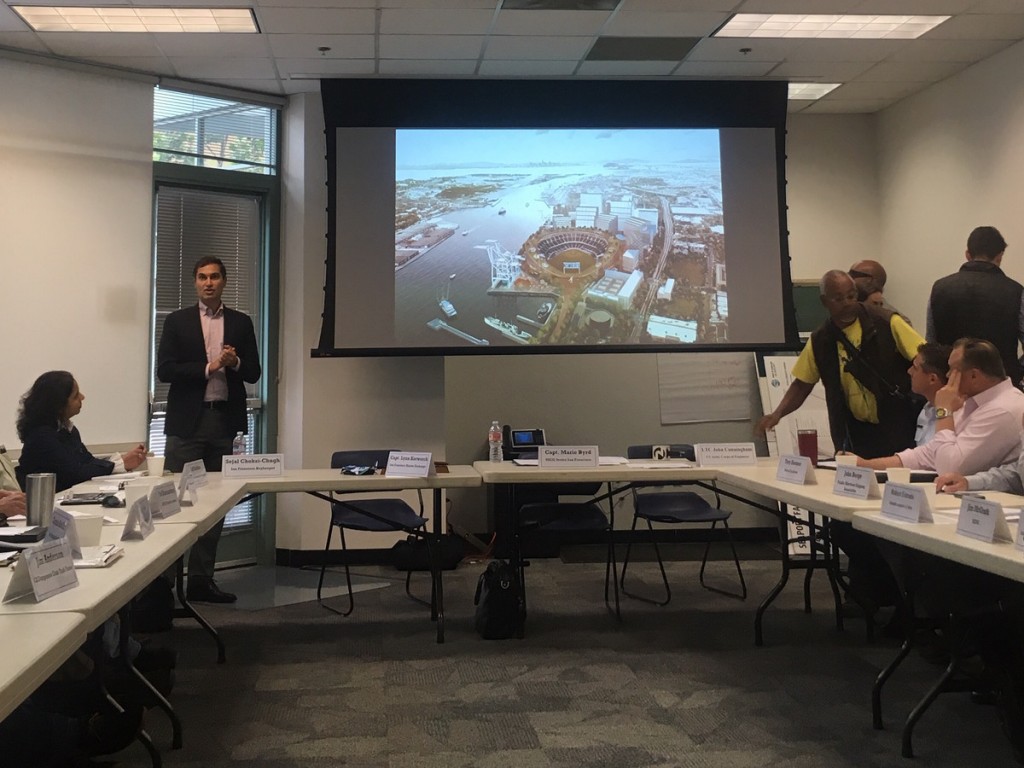Oakland A’s Kaval offers partnership but PMSA & ILWU are skeptical
Dave Kaval, president of the Oakland Athletics, wants a “partnership” with the Port of Oakland maritime industry so as to build the new A’s ballpark and “preserve and protect jobs on the waterfront.”
Speaking to the Harbor Safety Committee of the San Francisco Bay on August 8th, Kaval said that the A’s have pledged to:
- Reserve 10 acres from its proposed Howard Terminal ballpark property on the Oakland Estuary to be ceded for widening of the Port of Oakland Turning Basin. The Basin is part of the Estuary and adjoins Howard Terminal. The widening of the Basin would allow the Port to handle 18,000 teu and larger ships to be turned and docked at the Oakland International Container Terminal (OICT) at the western end of the Estuary. Currently the Port can handle ships up to 14,000 teus.
- Develop a transportation plan for ballpark fans that “will not impede” harbor trucking and rail access to and from the Port. This will include special pedestrian walkways so that fans can walk to the ballpark from parking lots and public transportation without crossing rail lines and truck lanes.
- Support “new infrastructure investments” that will increase spending on transportation access both for Port of Oakland tenants and for fans attending Oakland A’s baseball games.
- Situate the proposed ballpark on the eastern end of the Port’s Howard Terminal site as far away as possible from OICT. At night, this will minimize ballpark lighting obstructing the pilots and mariners who maneuver ships in and out of OICT at the western end of the Estuary. The stadium’s eastern placement also keeps pleasure boaters attending the games as far as possible from commercial vessel operations.
- Unlike at the San Francisco Giants ballpark, the proposed A’s stadium is designed to prevent baseballs leaving the ballpark and landing in the Oakland Estuary where boaters and kayakers looking for souvenirs might pose a hazard to container ships sailing in and out of the Estuary.
Kaval projects groundbreaking on the site by 2021 and opening the ballpark by 2023.

Nevertheless, Kaval’s assurances still drew criticism from representatives of the Pacific Merchant Shipping Association (PMSA) and the International Longshore and Warehouse Union (ILWU).
The two organizations’ opposition to the A’s ballpark reflects a new unity on the Oakland waterfront forged by two organizations that have not always worked together in the past. The two organizations say they are fighting to protect the Port of Oakland’s maritime future including the longshore, trucking, warehousing, freight-forwarding, brokerage, marketing and rail jobs that they say are under attack by real estate developers and their political allies.
Aaron Wright, business agent for ILWU Local 10, spoke out against the A’s proposal arguing that the A’s already had plenty of land at the current Oakland Coliseum site to build a new ballpark and for new condominiums.
Wright’s concern is that, in addition to the ballpark, the Oakland A’s are proposing to build condominiums next to the planned Howard Terminal ballpark.
“The overall picture is they want to put residential on this site right next to ….container operations. You have overweight trucking and rail running through here…. No multi-million condo owner is going to accept that at all…. Show us the overpasses. Show us the parking. Show us how this is going to work.”
Wright said he fears the result will be that maritime business and jobs will be driven away.
He urged Harbor Safety Committee members to support the ILWU’s effort to persuade the Oakland City Council to require the Oakland A’s build the new ballpark at its current site in East Oakland.
Kaval said the A’s are in the process of working with stakeholders on the environmental impact review and on the ILWU’s concerns and “to make sure this works for everyone.”
John Berge, vice president Pacific Merchant Shipping Association, appeared to agree with Wright and raised questions about whether the Athletics were acting in good faith.
Berge said PMSA is concerned that the Oakland A’s will not keep their environmental impact promises. He said the Athletics have hired lobbyists to work in the California Legislature, which he considers worrying. He says the lobbyists may be working to persuade legislators to insert amendments that would “bypass CEQA.” The result would avoid having the ballpark plan abide by provisions of the California Environmental Quality Act (CEQA).
© Copyright 1999–2024 American Journal of Transportation. All Rights Reserved


